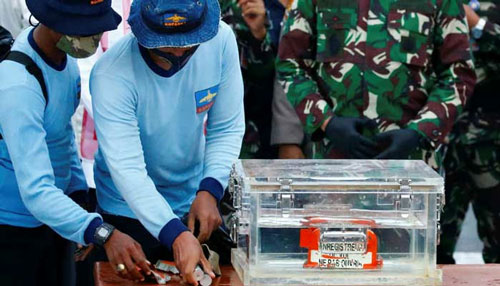Jakarta
The flight data recorder (FDR) of an Indonesian plane that crashed into the Java Sea with 62 people on board at the weekend, was retrieved by divers on Tuesday.
Divers had also found a separate radio beacon, raising hopes that the cockpit voice recorder (CVR) it was connected to could soon be found and reveal what caused the plane to lose control moments after takeoff.
“We are sure that, because the beacon that was attached to the cockpit voice recorder was also found around the area, so with high confidence, the cockpit voice recorder will soon be found,” military chief Hadi Tjahjanto said at a news conference.
With few immediate clues on what happened after takeoff, investigators will rely heavily on the flight recorders to determine what went wrong.
The Boeing 737-500 plane plunged into the sea on Saturday, four minutes after it departed from Jakarta’s main airport and disappeared off radar screens.
It was the second major air crash in Indonesia since 189 people were killed in 2018 when a Lion Air Boeing 737 MAX plunged into the Java Sea soon after taking off from Jakarta. The jet that crashed on Saturday was of a largely different design.
The National Transportation Safety Committee (KNKT) expects to download the FDR data within two to five days, its chief Soerjanto Tjahjono said.
“Hopefully we will be able to unveil the mystery of what caused this accident … so this becomes a lesson for all of us to avoid this in the future,” Soerjanto said. Earlier on Tuesday, more human remains were found at the crash site, as well as personal effects, such as wallets containing identification cards.
The plane had been headed to Pontianak on Borneo island, about 740 km (460 miles) from Jakarta.
The KNKT’s initial findings showed the plane’s engine was running when it hit the water, based on jet parts retrieved from the sea.
“The damage on the fan blade showed that the engine was still working on impact. This is consistent with the hypothesis that the plane’s system was still working at 250 feet altitude,” Soerjanto said.
Indonesia’s transport ministry said earlier on Tuesday the jet, which was grounded during the early months of the coronavirus pandemic, had passed an airworthiness inspection on Dec. 14 and had returned to service shortly after.
The Sriwijaya Air plane was nearly 27 years old, much older than Boeing’s problem-plagued 737 MAX model.
Older 737 models are widely flown and do not have the stall-prevention system implicated in the MAX safety crisis.—Reuters










